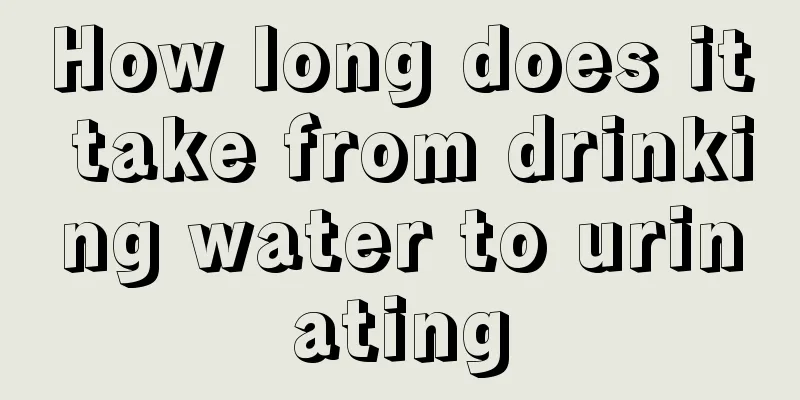How long does it take from drinking water to urinating

|
The amount of water you drink also determines the amount of urination. In order to make the body circulation better, you must drink enough water every day. But how long does it take from drinking water to urinating? This is different from a person's physical constitution. After water enters the body, it goes through a series of cycles. It is absorbed by the gastrointestinal tract and then emptied by the stomach. After a few minutes, the water will enter the small intestine and then enter the bladder waiting to be discharged. Food that enters the stomach usually does not go directly into the intestines, but stays here for a short time. The solid food will be further stirred and mixed with gastric juice to form chyme. The process of food being discharged from the stomach into the intestine is called gastric emptying. Water is hardly absorbed in the stomach and is mainly absorbed in the small intestine. Due to the presence of a large number of folds in the small intestinal mucosa, the absorption area can be considered infinite and the water absorption rate can also be considered infinitely fast. Therefore, it is the gastric emptying time that primarily limits water absorption. Water has a very short gastric emptying time. Generally, when the stomach is empty, some water will begin to enter the small intestine within 2 to 3 minutes. The time it takes for half of the water to be excreted is called half-excretion time. In addition to individual differences, it is mainly affected by the amount of water you drink. For example, it only takes 7.5 minutes for the stomach to empty half of 200 ml of water, and about 15 minutes for 500 ml of water. In short, from the time water is drunk into the mouth to the time it is discharged into the small intestine, the vanguard only takes less than 5 minutes, and entering the small intestine can almost be regarded as absorption into the blood. This stage lasts approximately 5 minutes. When water is absorbed into the blood and reaches the heart along the vena cava, it can be considered to be completely mixed with the water in the body. This takes only about 10 seconds. It is then pumped out by the heart, along the aorta into the renal artery and afferent arteriole, into the glomerulus, and begins to be filtered out as urine (primary urine). This process also takes about 10 seconds. The filtered primary urine enters the renal tubules at all levels for reabsorption, and finally enters the collecting duct and the renal pelvis to become the final urine. It then passes through the renal pelvis and ureters into the bladder. Urine is stored in the bladder, and when it reaches a certain amount, it stimulates the urge to urinate (only 150 ml is required at the minimum, and the urge to urinate is usually obvious at 250-350 ml). After having a clear urge to urinate, people choose the right time and place to urinate and excrete urine out of the body. The time urine stays in the bladder is affected by many factors, especially how much water you drink. If you drink a lot of water continuously, the stomach can empty 1000~1500 ml per hour, and a large amount of urine will be formed in a short period of time. From the time you start drinking water, you can urinate in less than 30 minutes. If, in a state of severe dehydration, only 500 to 900 ml of urine is produced every day, it may take several or even more than ten hours from drinking a small amount of water to urinating. That is to say, the time urine stays in the bladder is the most uncertain. How long does it take for water to turn into urine? Judging from the above journey of water in the body, the concept of "urine" at least includes the primary urine that is initially filtered out, the final urine formed by the final filtration of the glomerulus, and the urine excreted from the body through the urethra. Primary urine is not real urine. The urine excreted from the body is "old urine" that has been "delayed" in the bladder for an indefinite period of time after becoming urine. Therefore, the most consistent statement of "water turning into urine" should be the final urine filtered through the glomerulus in the collecting duct and renal pelvis. The final urine is not greatly affected by the body's hydration status, and there is an approximate "accurate number" for the formation time: that is, from the time water enters the mouth to the formation of final urine, the shortest time will not be greater than 5 minutes + 10 seconds + 10 seconds + glomerular transit time. That is, water turns into urine in less than 6 minutes at the fastest. |
<<: What are the muscles on both sides of the neck called?
>>: Which blood position can be pressed to stop coughing
Recommend
How to eliminate static electricity on your body
Every time when autumn comes, the weather becomes...
What to do when you have a lot of work pressure
If the work pressure is too great but you do not ...
Is eating bird's nest useful?
Many people are very familiar with bird's nes...
What is the cause of right shoulder pain
What causes right shoulder pain? People with bad ...
What are the symptoms of Sheehan syndrome
For all expectant mothers, when welcoming the arr...
Can vitamin E remove chloasma? What is the principle?
Many friends know that using vitamin E can help r...
How to fix a broken zipper
In daily life, we often encounter broken zippers ...
What are right brain memory methods?
The right brain memory method is a memory method ...
Quickly improve IQ in 7 days, several ways to improve IQ
Although IQ is often innate, it can be improved t...
How can I clean the oil stains on clothes?
For housewives, every housework is not too diffic...
Etiology of esophageal cancer
The cause of esophageal cancer is still unclear, ...
Daily dietary principles for patients with rectal cancer
Patients with rectal cancer often have symptoms s...
Will chocolate cause a sore throat?
Chocolate is a very common food in our lives. Thi...
What is the reason for high crystallinity in urine routine test
If the urine routine shows high crystals, we shou...
Is colon cancer contagious through feces?
Is colon cancer contagious through feces? Cancer ...









